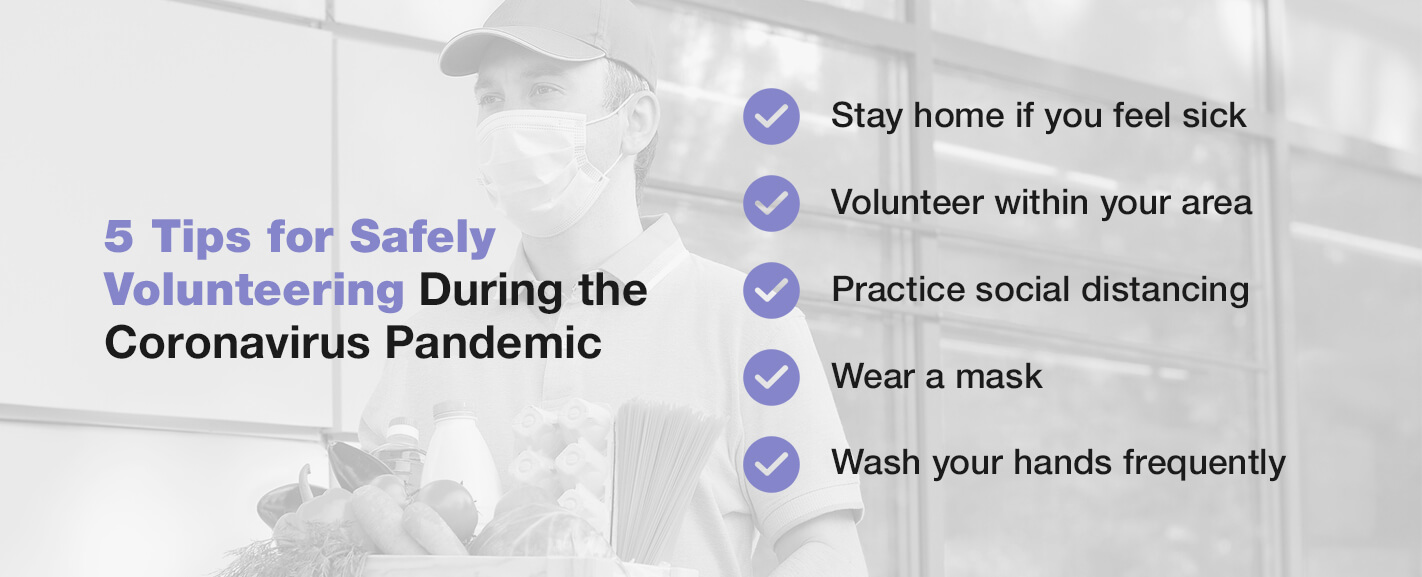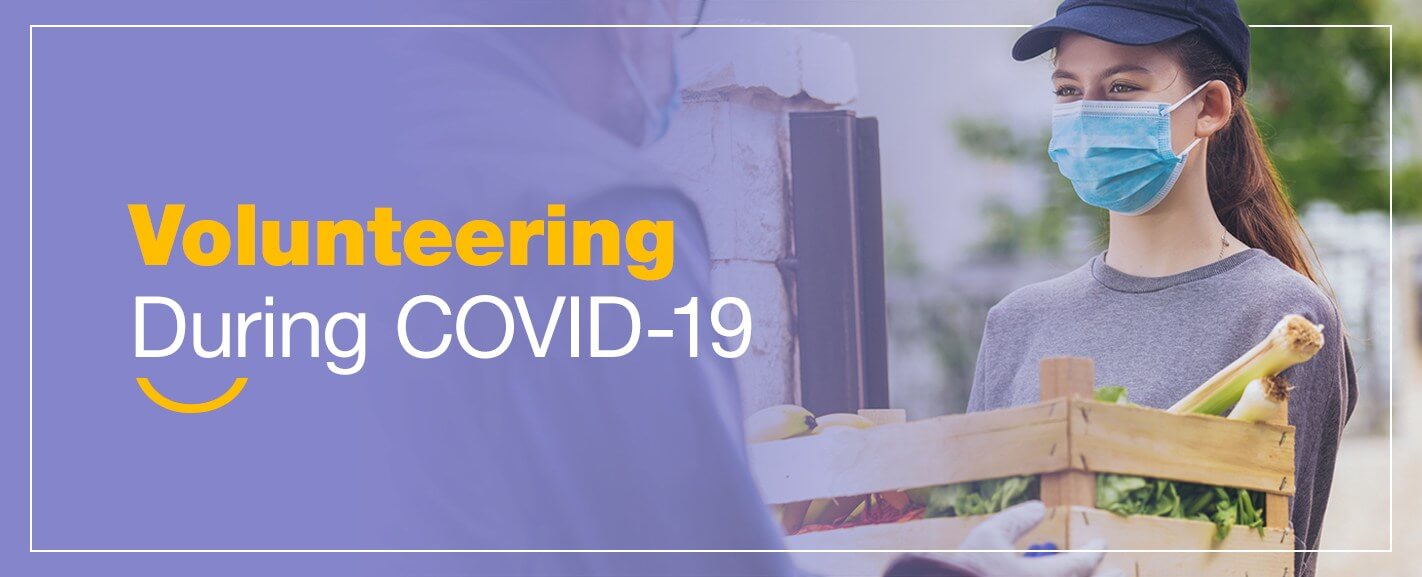COVID-19 has taught us many things. Some learned how to bake bread and others explored their cosmetology skills — but we all gained a deeper appreciation for our communities and the feeling of togetherness. For many, the coronavirus pandemic has generated a community-wide desire to give back to those in need. If you’re looking for ways to safely help your community during COVID-19, consider these tips and volunteer locations fitted to your community’s needs.
How to Safely Volunteer During COVID-19
Following the Centers for Disease Control and Prevention (CDC) guidelines, most organizations have altered their volunteer opportunities to serve those in need while keeping volunteers and other community members safe. If you’re contemplating how and where to volunteer during the coronavirus pandemic, consider the following list of opportunities available in your community:
1. Donate to Food Banks
Many people are struggling to make ends meet, with one in six American adults relying on donated food or food banks as their source of nutrition. If you can, donate your time to aid in the distribution of donated food, or you can opt for food donations like:
- Canned soups
- Canned fish
- Canned vegetables
- Canned fruit
- Dried fruit
- Dried herbs and spices
- Granola bars
- Cooking oils
- Applesauce
- Crackers
- Pasta
- Peanut butter
- Rice
Aim for non-perishable goods, and avoid any food items that require refrigeration or those kept in fragile packaging, such as glass jars. Contact your local food bank to learn more about their unique volunteer opportunities and the items they’re most in need of.
2. Deliver Food and Supplies to Older Adults and Vulnerable Populations
Consider donating care packages to vulnerable populations, such as older adults or others at high risk for severe COVID-19 symptoms. Because these vulnerable populations are at a higher risk, they may be unable to go to stores freely and purchase daily necessities. Some may not have the financial means to do so.
Care package essentials you may consider including are:
- Toiletries, namely toilet paper
- Masks
- Hand sanitizers
- Tissues
- Meal kits
- Snacks
- Journals
You can deliver these care packages to nursing homes, or you can safely distribute them on doorsteps to meet social distancing standards.

3. Volunteer Virtually
Another great lesson we’ve learned during this pandemic is the power of technology. If you have access to a computer, webcam, and microphone, you can volunteer from the safety and comfort of your home. Some ways you can volunteer virtually include:
- Training to be a crisis contact: Since the start of the COVID-19 pandemic, an estimated 40.9% of American adults report experiencing at least one onset mental health condition, such as anxiety and depression. And with suicidal ideation on the rise, crisis lines need help more than ever. Contact a crisis line that resonates with you, and most will provide you with the necessary training to become a contact for those in need.
- Translating: If you’re fluent in more than one language, consider donating your time to help those who require translation, either for learning, work, or other social purposes.
- Tutoring: The COVID-19 pandemic greatly shifted students’ learning environment, ultimately impacting the way students learn and their learning ability. Consider helping students of all levels by offering virtual tutoring services.
Visit a volunteer service resource to look for virtual volunteer opportunities within your area.
4. Donate Supplies or Time to the Health Care Industry
If you’re a licensed health care professional, you may consider volunteering your time to help the health care industry as it battles the COVID-19 pandemic effects. According to the American Hospital Association (AHA), the health care industry has faced problems like:
- Drug shortages
- Wage and labor costs
- Personal protective equipment, medical supplies, and equipment costs
- Capital costs from COVID-19, like testing tents and treatment beds
If you are unable to volunteer your time or talents to your local hospital, consider making a monetary donation to a nonprofit organization or donating physical items such as masks, hand sanitizers, gloves, and other cleaning materials.
5. Help Animal Shelters
People aren’t the only ones struggling during the COVID-19 pandemic. Animal shelters and rescue groups are feeling the strain of the influx of animals looking for their forever home. If you’re looking to add a pet to your family, now is an opportune time to do so. Or, if you’re not ready or are unable to add a permanent family member, consider offering your home and fostering an animal in need.
Animal shelters and rescue groups are also accepting monetary donations, or other items such as unopened food and treats, disinfectable toys, office supplies, sheets and blankets, and cleaning supplies.
Other Ways to Serve Your Community During the Coronavirus Pandemic
In addition to the aforementioned volunteer opportunities, other ways you can safely volunteer and serve your community during COVID-19 include:
- Checking on your neighbors, friends, and family members: When considering how to volunteer remotely during COVID-19, one of the simplest ways is by reaching out to your neighbors, friends, and family members. The safety precautions surrounding the coronavirus may make people feel isolated. Reaching out to your loved ones and asking what you can do to help them during this time can change their perspective for the better.
- Donating money, supplies, and time: There are likely many donation opportunities within your community that you can pursue. Contact your local churches, shelters, and other organizations to see what donations they’re currently accepting.
- Donating blood: Patient needs with the pandemic are increasing, and the number of people donating blood is dropping. Patients in need of blood transfusions will be thankful for your donation. And for those who have tested positive for COVID-19, researchers can test the antibodies present in your blood to aid in the discovery of a safe vaccine.
Although the coronavirus presents obstacles in supporting your community, the available volunteering opportunities can change a person’s or animal’s life for the better.

5 Tips for Safely Volunteering During the Coronavirus Pandemic
Volunteer organizations are altering their volunteer opportunities to meet the safety precautions outlined by the CDC. It’s recommended to arrive at your volunteer destination early, as organizations will likely ask you COVID-19 screening questions and outline the changes made to their usual standards. In addition to volunteering precautions, you can implement the following safety tips for volunteering during COVID-19:
- Stay home if you feel sick: If you’re feeling under the weather, even outside of COVID-19 symptoms, opt for remote volunteering services to prevent the potential spread of illness.
- Volunteer within your area: Look for volunteer opportunities within close proximity to your home. Traveling is not recommended, as you may unknowingly spread COVID-19 to other communities.
- Practice social distancing: When in groups, practice social distancing standards by keeping a 6-foot distance between yourself and other people.
- Wear a mask: Research suggests that COVID-19 spreads through respiratory droplets when a person coughs or sneezes, and other research also suggests it’s an airborne disease. Nonetheless, it’s recommended to wear a mask to prevent spread and comply with state mask mandates.
- Wash your hands frequently: In addition to avoiding touching your hands and face, experts recommend washing your hands frequently to prevent the spread of COVID-19.
Visit the CDC website for other tips on staying safe during the COVID-19 pandemic, and contact your volunteer organization for more information before volunteering.
Manage Your Volunteer Organization Using Volgistics’ Customizable Platform
Safety is the number one priority when volunteering during the pandemic. As the world of volunteering changes, rely on Volgistics’ customizable platform to track volunteer compliance, communicate with your volunteers, and increase overall engagement — subsequently strengthening your organization and helping your community.
Reach out to Volgistics today, and our dedicated team will work with you and your organization’s unique needs to streamline your volunteer management.

